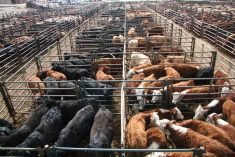KANANASKIS, Alta. — To support or not support is the question many food processors face when dealing with genetically modified products.
The trade association that represents 180 food manufacturers hopes a new study will make the question easier to answer.
Laurie Curry, vice-president of the Food and Consumer Products Manufacturers of Canada, said it isn’t a consumer-driven controversy.
“In fact, it is more about leadership positioning and competitiveness than it is in respect to consumers,” she told the Western Canadian Wheat Growers annual convention at Kananaskis.
Read Also

Canada told trade crisis solutions in its hands
Canadians and Canadian exporters need to accept that the old rules of trade are over, and open access to the U.S. market may also be over, says the chief financial correspondent for CTV News.
She said the issue came to a head in 1996 when GM soya arrived in Germany from the United States.
Europe had no broad-based regulations or approval process to assess biotechnology products. That has since changed as more nations define genetic modification and decide what is safe for human consumption.
Five years ago European retailers quickly released food that was labeled “GM free.” This was a selling feature that forced competitors to step forward with similar product lines.
Within three weeks, the GM issue took on a domino effect as one food manufacturing company after another announced it had rejected GM products.
Curry said this gave GM supporters no time to defend themselves.
Greenpeace and the Sierra Club met with Canada’s food manufacturers association and demanded mandatory labeling by the end of 1999 and a ban on GM food within three to four years.
Canadian food manufacturers responded 21 months ago with a task force that meets weekly to receive updates on GM food issues.
Manufacturers’ association members include grocery distributors, supermarket chains and the Canadian Federation of Agriculture. Curry said the group wants a balanced approach and is trying to persuade the public that it is unbiased on the issue.
“As food manufacturers we are not proponents of biotechnology,” she said.
However, the association doesn’t reject it either. Instead, she said, it wants to protect the technology because of possible future benefits from enhanced nutritional properties in food.
Label troubles
GM-free labels are a problem for the group. Curry said competitors could demand the removal of food labeled as GM-free because it would be seen as providing an unfair competitive edge.
She said association members use a list of approved ingredients supplied by the Canadian Food Inspection Agency, and abide by the food regulatory system.
As well, the manufacturers’ association is part of a working group of 50 members attempting to establish labeling rules.
“Labeling is also absolutely key for us.”
The language on labels must be clear, she said, and must avoid scientific terms that may not be meaningful to the average shopper.
The group wants labels that are understandable, informative, verifiable, carry no false claims, and are not misleading.
She said Greenpeace and the Sierra Club are boycotting the process because it does not stipulate compulsory labeling.
The labeling committee also believes more consumer research is needed. However, it must be unbiased research.
Curry said surveys should not ask leading questions or provide fact sheets before questioning.
Surveys should evaluate how much education is needed, assess the consumer reaction to GM products and gather opinion on whether consumers support potential price increases that are needed to label foods.

















